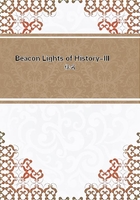
第192章
And in regard to corruption,--the sin which cast Bacon from his high estate, though fortunately he did not fall like Lucifer, never to rise again,--may not the verdict of the poet and the historian be rather exaggerated? Nobody has ever attempted to acquit Bacon for taking bribes. Nobody has ever excused him. He did commit a crime; but in palliation it might be said that he never decided against justice, and that it was customary for great public functionaries to accept presents. Had he taken them after he had rendered judgment instead of before, he might have been acquitted;for out of the seven thousand cases which he decided as Lord-Chancellor, not one of them has been reversed: so that he said of himself, "I was the justest judge that England has had for fifty years; and I suffered the justest sentence that had been inflicted for two hundred years." He did not excuse himself. His ingenuousness of confession astonished everybody, and moved the hearts of his judges. It was his misfortune to be in debt; he had pressing creditors; and in two cases he accepted presents before the decision was made, but was brave enough to decide against those who bribed him,--hinc illae lacrymae. A modern corrupt official generally covers his tracks; and many a modern judge has been bribed to decide against justice, and has escaped ignominy, even in a country which claims the greatest purity and the loftiest moral standard. We admit that Bacon was a sinner; but was he a sinner above all others who cast stones at Jerusalem?
In reference to these admitted defects and crimes, I only wish to show that even these do not make him "the meanest of mankind."What crimes have sullied many of those benefactors whom all ages will admire and honor, and whom, in spite of their defects, we call good men,--not bad men to be forgiven for their services, but excellent and righteous on the whole! See Abraham telling lies to the King of Egypt; and Jacob robbing his brother of his birthright;and David murdering his bravest soldier to screen himself from adultery; and Solomon selling himself to false idols to please the wicked women who ensnared him; and Peter denying his Master; and Marcus Aurelius persecuting the Christians; and Constantine putting to death his own son; and Theodosius slaughtering the citizens of Thessalonica; and Isabella establishing the Inquisition; and Sir Mathew Hale burning witches; and Cromwell stealing a sceptre; and Calvin murdering Servetus; and Queen Elizabeth lying and cheating and swearing in the midst of her patriotic labors for her country and civilization. Even the sun passes through eclipses. Have the spots upon the career of Bacon hidden the brightness of his general beneficence? Is he the meanest of men because he had great faults?
When we speak of mean men, it is those whose general character is contemptible.
Now, see Bacon pursuing his honorable career amid rebuffs and enmities and jealousies, toiling in Herculean tasks without complaint, and waiting his time; always accessible, affable, gentle, with no vulgar pride, if he aped vulgar ostentation; calm, beneficent, studious, without envy or bitterness; interesting in his home, courted as a friend, admired as a philosopher, generous to the poor, kind to the servants who cheated him, with an unsubdued love of Nature as well as of books; not negligent of religious duties, a believer in God and immortality; and though broken in spirit, like a bruised reed, yet soaring beyond all his misfortunes to study the highest problems, and bequeathing his knowledge for the benefit of future ages! Can such a man be stigmatized as "the meanest of mankind"? Is it candid and just for a great historian to indorse such a verdict, to gloss over Bacon's virtues, and make like an advocate at the bar, or an ancient sophist, a special plea to magnify his defects, and stain his noble name with an infamy as deep as would be inflicted upon an enemy of the human race? And all for what?--just to make a rhetorical point, and show the writer's brilliancy and genius in making a telling contrast between the man and the philosopher. A man who habitually dwelt in the highest regions of thought during his whole life, absorbed in lofty contemplations, all from love of truth itself and to benefit the world, could not have had a mean or sordid soul. "As a man thinketh, so is he." We admit that he was a man of the world, politic, self-seeking, extravagant, careless about his debts and how he raised money to pay them; but we deny that he was a bad judge on the whole, or was unpatriotic, or immoral in his private life, or mean in his ordinary dealings, or more cruel and harsh in his judicial transactions than most of the public functionaries of his rough and venal age. We admit it is difficult to controvert the charges which Macaulay arrays against him, for so accurate and painstaking an historian is not likely to be wrong in his facts; but we believe that they are uncandidly stated, and so ingeniously and sophistically put as to give on the whole a wrong impression of the man,--making him out worse than he was, considering his age and circumstances. Bacon's character, like that of most great men, has two sides; and while we are compelled painfully to admit that he had many faults, we shrink from classing him among bad men, as is implied in Pope's characterization of him as "the meanest of mankind."We now take leave of the man, to consider his legacy to the world.